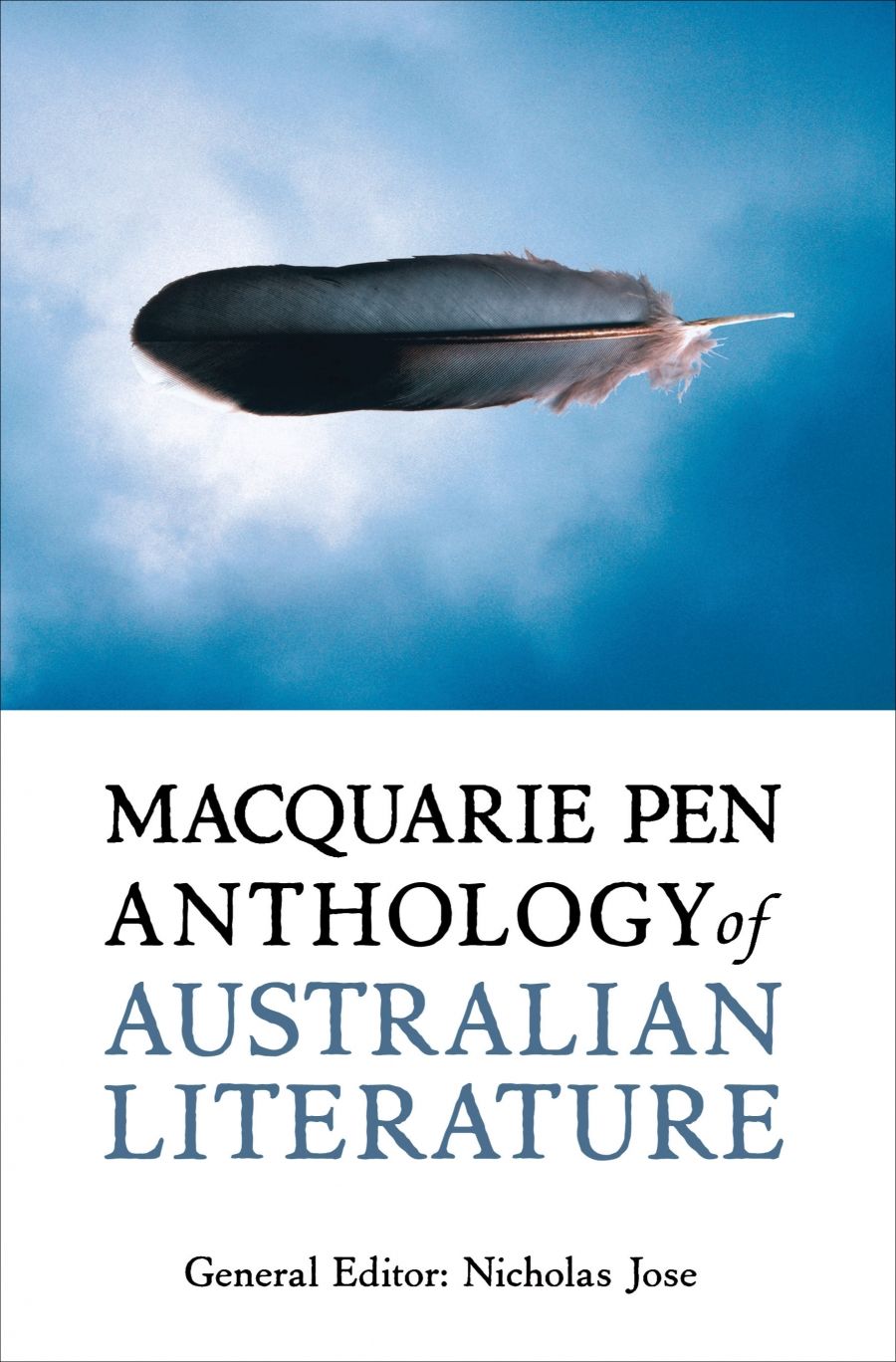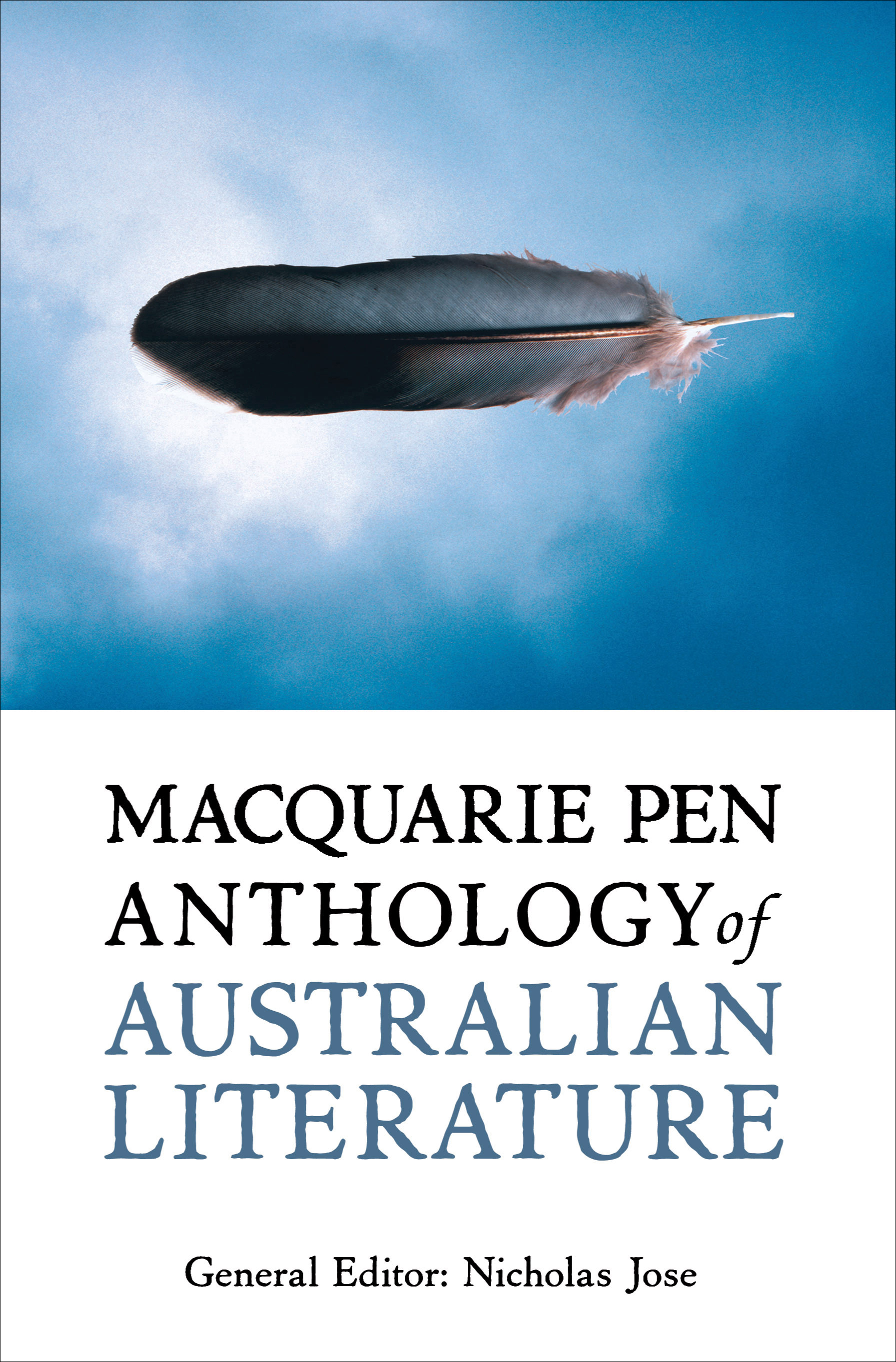
- Free Article: No
- Contents Category: Literary Studies
- Review Article: Yes
- Article Title: Obscuring the heritage
- Article Subtitle: Regrettable omissions in the new national anthology
- Online Only: No
- Custom Highlight Text:
There are a hundred ways of putting together any anthology, most of which are going to annoy somebody. In the case of that much sought-after beast, Australian literature, editors have a fair chance of turning into the quarry. It is not so long since J.I.M. Stewart said, from his chair of English in Adelaide, that there wasn’t any Australian literature so he was going to lecture on D.H. Lawrence’s Kangaroo instead.
- Book 1 Title: Macquarie Pen Anthology of Australian Literature
- Book 1 Biblio: Allen & Unwin, $69.95 hb, 1502 pp
- Book 1 Cover Small (400 x 600):

- Book 1 Cover (800 x 1200):

In 1940 no one thought there was an Australian literature. By the 1960s we knew that we had a tradition, much of it classic, not least through the pioneering critical efforts of Vincent Buckley and Chris Wallace-Crabbe, Leonie Kramer and G.A. Wilkes.
For someone who was growing up before the publication of Monkey Grip or Johnno, before the advent of the Hibberd and Williamson plays, the dawning recognition that Les Murray and Peter Porter were among the better poets in the world, that John Tranter, Robert Adamson, and John Forbes could fly a flag that could be acknowledged by the Ashberys and the Black Mountaineers, that Murray Bail, Gerald Murnane and Peter Carey were in their Bush Modernist ways tinkering with literary form in interesting fashion, there was still plenty to be getting on with.
A child of the 1960s had an implicit canon in her head. Patrick White was the goods, the equal of Nabokov or Beckett. Stead, in her best work, was White’s equal. Martin Boyd showed the complexity and sophistication of the Anglo-Australian past and could be compared, as Wallace-Crabbe pointed out, to Anthony Powell. The spirit of Irish shaggy doggery, Shandyan and tilting towards that modernist category of Northrop Frye, the anatomy, the book that Don Quixote-like defied categorisation was Joseph Furphy’s Such Is Life.
Henry Lawson, in his great stories such as ‘The Bush Undertaker’, was a real literary artist. The period in Australian history that saw the first hallowing of White and Manning Clark and Barry Humphries was a confident moment. It was capable of recognising instant classics in Randolph Stow’s Tourmaline or Thomas Keneally’s Bring Larks and Heroes.
It is easy to forget that forty-five years ago the ABC could film Douglas Stewart’ s verse play about Ned Kelly in the same way that it could broadcast a Macbeth shot partly in the Dandenongs. A literary Australian of middle years is likely to have grown up not only knowing, as his forebears did, the ballads of Paterson and Lawson, C.J. Dennis and John O’Brien, but with chunks of Hope’s ‘Death of a Bird’, Judith Wright’s ‘Woman to Man’ and Kenneth Slessor’s ‘Five Bells’ in his head.
The new PEN anthology, edited by Nicholas Jose, pays some lip service to all this, but it is further than you might hope from the spirit that produced it. It is always disconcerting when an anthology fails, as this one does, to include something like ‘Clancy of the Overflow’ or even Slessor’s other great anthology piece, ‘Sleep’ – just the sort of thing an adolescent might cotton on to, and also a terrific poem.
Do you give yourself to me utterly,
Body and no-body, flesh and no-flesh,
Not as a fugitive, blindly or bitterly,
But as a child might, with no other wish?
Yes, utterly…
At least the poetry (which has been chosen by David McCooey) has the virtue of attending to the different strands of Australian verse. Still, I can’t believe he doesn’t have Peter Porter’s ‘Non Piangere, Liù’, one of the greatest things ever written by an Australian, or Les Murray’s ‘Bent Water in the Tasmanian Highlands’, which shows how close Murray is to being an abstractionist à la John Ashbery and is by way of being the Giotto’s circle demonstration of his greatness. It indicates the Fred Williams side of Murray’s genius, which can leave those who are unstirred by the cows and the greater glory of God breathless with admiration.
But these are only quarrelsome instances, and the outlines of different poetic traditions are at least indicated here. On the other hand, an anthology of 1,500 pages had room to instantiate the canon it gestured towards. The PEN anthology does not do this, even in the case of poetry, where the task was easier. The selections of Slessor, Hope, Porter and McAuley (all of whom are taken seriously) are expert as far as they go, but would scarcely be adequate for a medium-sized anthology. In the case of most people (Vincent Buckley, say), the page or so is an inadequate snippet. There was the opportunity with this volume to present at proper length a major figure such as Frances Webb, who is widely venerated by all the poetic factions, and rightly so. The same would be true of Bruce Beaver.
Pleasingly, McCooey gives us a generous taste of Laurie Duggan’s Gippsland epic, The Ash Range. He looks less at home with the ins and outs of Alan Wearne’s verse novels, though they are represented. It would have been good to see those late sonnets of Martin Johnson, reminiscent of William Empson but with a greater depth (‘Grief breaks the heart and then the grief comes next’). If Australian poetry lives, it is because of such things.
All too often with anthologies it becomes a version of the union buries its dead. The implicit argument is, ‘how are we going to fit Ania Walwicz in if we include all the best Gwen Harwood poems?’
The fiction section has the advantage of including chunks of Lawson, Furphy, Richardson, White, Stead, Keneally, David Malouf, Shirley Hazzard, Carey, Bail, Helen Garner and so on, though it tends to go for self-contained episodes rather than for greatest hits. There would have been a case for including a medley of Patrick White: the opening of Tree of Man (to which Hope took such exception), the Joycean section of The Vivisector and a taste of The Solid Mandala. This would have opened doors to the interested browser.
As it is, the logic is far more introductory than it is reflective of a canon. There are also absurd omissions. Although the fiction is at its strongest with Kerryn Goldsworthy’s post-1950s selections, it is difficult to credit the absence of Amy Witting, of whom Slessor said (to Thea Astley): ‘Tell that woman I will publish any word she writes.’ It also seems a pity to have Murnane in more discursive mode, using his famous manner to something other than fictional effect. Some of the finest short stories of this period are by Catherine Ford, who is not to be found here. It is good to have Elizabeth Jolley’s autobiographical fiction represented, but what about the black comedy? It’s pleasing to have Delia Falconer, but what about James Bradley? The selection of Garner is sensible, and it’s fine to have a chunk of Kate Grenville’s Lilian’s Story, but I’m surprised that we don’t get any of Julia Leigh’s The Hunter, that dazzling début. If you want Christos Tsiolkas, wouldn’t the cum and commotion of Loaded be better than the vampirism of Dead Europe? Of the dramatists I missed Hibberd and Steve Sewell, but was grateful for Hannie Rayson.
The non-fiction selections – again down to Dr McCooey – are a bit of a dog’s breakfast. Yes, The Watcher on the Cast-Iron Balcony is a masterpiece (it is highlighted at the expense of the fact that Hal Porter, arguably the greatest short story writer in our history, is not shown in this mode), but why not have a chunk of Craig Sherborne’s memoirs, given that he is so patently Porter’s successor? It is good to have Clive James’s Unreliable Memoirs, but what about the essays and, for heaven’s sake, the poetry? We get Geoffrey Blainey but no Bernard Smith; Robert Dessaix but no Nicolas Rothwell. Astonishingly, Robert Hughes is represented only by a journalistic bit of Culture of Complaint, where The Fatal Shore is a greater imaginative achievement, a more notable act of writing, than most Australian fiction, even of the first rank.
This leaves the final glaring failure of the PEN anthology. It overflows with Aboriginal writing, much of which has no literary value whatever. This is inexplicable, given the availability of the Macquarie PEN Anthology of Aboriginal Writing (ABR, May 2008), of which this selection is ‘a different configuration’. It is hard to see what can have possessed the editors (Anita Heiss and Peter Minter were in charge of this area) to publish reams and reams of everything from Bennelong’s letter to speeches by Patrick Dodson and articles by Marcia Langton – and every kind of doggerel and naïve bit of memoir writing besides.
If someone were to publish this amount of African American writing in a comparable anthology of American literature, they would be laughed to scorn, though blacks constitute a much higher percentage of the US population and their objective literary achievement is considerably higher.
The sheer quantity of Aboriginal writing included in this volume – much of it devoid of literary quality or even literary ambition – is an egregious mistake. It diminishes the importance of Aboriginal culture and obscures the work of serious black writers, such as Alexis Wright, who now constitute a tiny fraction of the total.
There is a real heritage in this book. It’s just a pity that the editors have wasted so many pages on material that had no place in it.


Comments powered by CComment